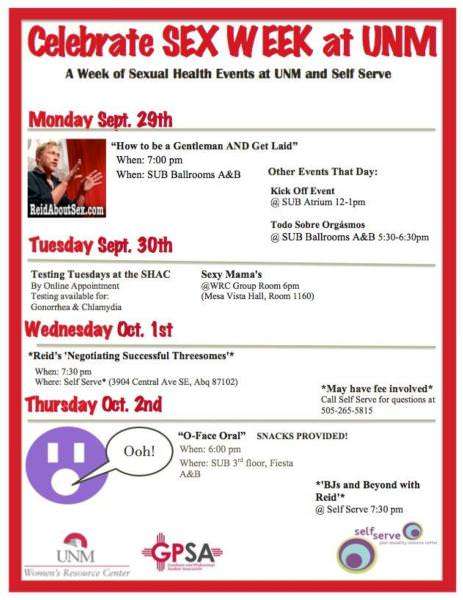University Violates Its Own Speech Code; Free Speech Group Discovers a Drawback to Pointing This Out
Free expression takes a blow at the University of New Mexico.

How loosely worded is the University of New Mexico's sexual harassment policy? Its ban on "displaying sexually suggestive objects, pictures, cartoons, or posters" has just one exception—for "art displayed in museums"—and even then "the situation will be evaluated for appropriateness." Last week Samantha Harris, an attorney at the civil libertarian Foundation for Individual Rights in Education (FIRE), pointed out one consequence of a restriction so broad: The university's own Women's Resource Center was violating it.
September 29–Oct 2 is "Sex Week" at UNM—a weeklong series of programs for students including "Negotiating Successful Threesomes," "O-Face Oral" and "BJs and Beyond." Sex Week is sponsored in part by the university's Women's Resource Center. Sex Week also violates the university's own speech codes, since even the titles of the workshops—and thus any Sex Week promotional materials—are "sexually suggestive."
At the time Harris was writing, the university was defending the event against offended conservatives by invoking the value of free expression. Harris offered the obvious response: "If UNM truly believes what it is saying…why does it maintain unconstitutional speech codes that prohibit exactly the kind of speech at issue here?"
If the university was listening, it learned the wrong lesson. Harris' colleague Susan Kruth picks up the story:
UNM released a statement on Wednesday apologizing for "the inclusion of topics that are sensational and controversial." Vice President for Student Affairs Eliseo Torres promises in the statement, "We will do a better job in the future of vetting and selecting programs offered through campus groups."
Needless to say, freedom of speech does not require a public university to sponsor such an event, as opposed to merely allowing it to take place. But it's dispiriting to watch the college plunge from praising free speech to apologizing for being "controversial." (God forbid that there be controversy on campus.) This clearly isn't an institution on the verge of rethinking its rules.
On the bright side, I haven't seen any reports of anyone being charged with harassment for posting a Sex Week flier on a bulletin board.


Show Comments (33)